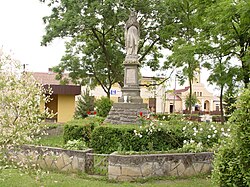Oleśnica, Świętokrzyskie Voivodeship
| Oleśnica | ||
|---|---|---|
| Village | ||
 |
||
|
||
| Coordinates: 50°27′12″N 21°03′54″E / 50.45333°N 21.06500°E | ||
| Country |
|
|
| Voivodeship | Świętokrzyskie | |
| County | Staszów | |
| Gmina | Oleśnica | |
| Sołectwo | Oleśnica | |
| Elevation | 182.1 m (597.4 ft) | |
| Population (31 December 2009 at Census) | ||
| • Total |
|
|
| Time zone | CET (UTC+1) | |
| • Summer (DST) | CEST (UTC+2) | |
| Postal code | 28-220 | |
| Area code(s) | +48 41 | |
| Car plates | TSZ | |
| Website | http://www.olesnica.realnet.pl/ | |
Oleśnica[ɔlɛɕˈnit͡sa] is a village in Staszów County, Świętokrzyskie Voivodeship, in south-central Poland. It is the seat of the gmina (administrative district) called Gmina Oleśnica. It lies in historic Lesser Poland, approximately 15 kilometres (9 mi) south-west of Staszów and 58 km (36 mi) south-east of the regional capital Kielce. The village has a population of ![]() 1,962, and used to be a town from 1470 to 1869.
1,962, and used to be a town from 1470 to 1869.
During the reign of King Kazimierz Wielki, Oleśnica was the seat of a Roman Catholic parish, which covered the area of 49 square kilometers. The village furthermore served as main residence of the noble Oleśnicki family (later, it belonged to the Zborowski family and the Lubomirski family). The father of Cardinal Zbigniew Oleśnicki was born here.
Oleśnica received Magdeburg rights in the year 1470, and during the Polish Golden Age, it was a small town, with 12 artisans. Furthermore, since the mid-16th century, it was a local center of the Protestant Reformation, with a Calvinist prayer house, opened here in 1563 by Mikolaj Zborowski. The population of the town remained small - in 1673, it was only 184. Oleśnica was completely destroyed in the Great Northern War, and after the Partitions of Poland it briefly belonged to the Habsburg Empire, to be annexed in 1815 by the Russian-controlled Congress Poland, where it remained until 1915. Due to proximity of the tightly locked Austrian - Russian border, Oleśnica's development was halted, and finally, after the January Uprising, it lost the town charter.
...
Wikipedia


